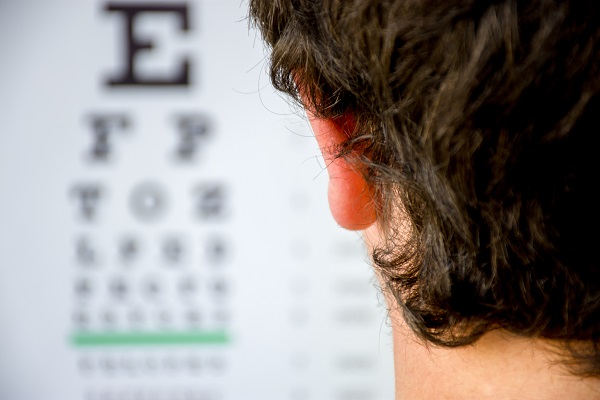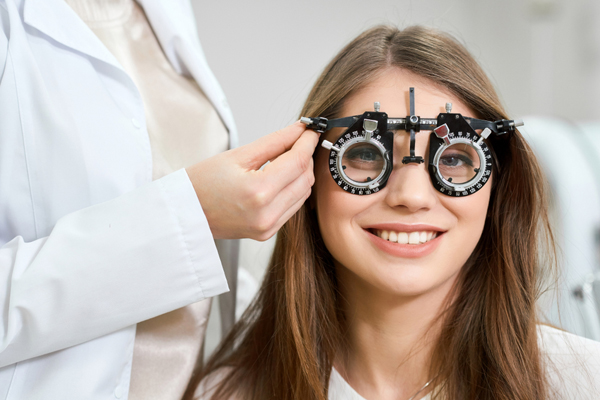Common Treatments and Eye Care for Myopia

Looking for information on Myopia? Read on to learn more about this condition and how it is treated. According to the American Academy of Ophthalmology, myopia affects an estimated 25% of Americans. The good news is that treatment is simple and effective for most patients who are diagnosed with myopia (or a similar eye condition).
What is myopia?
Myopia, also called nearsightedness, is an eye-focusing disorder (rather than a disease) in which objects that are far away are less clear than they should be. This is usually caused by a refractive error in which the eyes do not focus light properly on the retina. The symptoms of myopia can include:
- Blurred vision
- Eyestrain
- Squinting
- Frequent headaches
Blurred and/or distorted vision are symptoms of myopia when viewing objects that are far away; difficulty viewing objects that are near is known as farsightedness (hyperopia). Specifically, myopia is generally caused by a cornea that is steeply curved. In some cases, an eye that is too long can cause myopia as well. Focusing on close objects and less time spent outdoors at a young age are believed to increase the risk of myopia.
An eye doctor can diagnose myopia during an in-office comprehensive eye examination. This may include a standard eye test (reading letters off of a chart from a specified distance). The doctor may also use a retinoscope and/or a phoropter to assist with the diagnostic process.
How can an optometrist treat myopia?
There are several treatment options that are available to patients who are diagnosed with myopia. The recommended treatment solution usually depends on the severity of the condition and the patient’s treatment preference. The four most commonly recommended treatments for myopia include eyeglasses, contact lenses, vision correction surgery, and orthokeratology.
Eyeglasses and contact lenses
Eyeglasses and contact lenses are the two most common types of treatment for myopia because they both provide a long-term and effective solution for patients. Eyeglasses and contact lenses both work by correcting refractive errors with the eyes. In simpler terms, they improve the patient’s vision and allow them to see objects that are farther away more clearly, which can improve their ability to function daily (e.g., improved driving).
There are pros and cons to both prescription eyeglasses and contact lenses. It is best to discuss the differences of each option to determine which is most appropriate and convenient for you, along with discussing the possibility of vision correction surgery or ortho-k therapy (see below).
Vision correction surgery
Vision correction surgery, or refractive surgery, is a treatment option for many patients with myopia. This surgical procedure involves reshaping the cornea with a laser to adjust the way that light travels through it. The most commonly performed refractive surgery is the laser-assisted in situ keratomileusis procedure, more simply referred to as LASIK.
Orthokeratology (ortho-k)
Orthokeratology, also called ortho-k for short, is a lesser-known treatment solution for myopia, but it can be incredibly effective for many patients. This common myopia treatment involves the patient wearing a series of special contact lenses (they are harder than the average contact lens); these contact lenses flatten the cornea over time.
For many patients, the results of ortho-k are effective but only temporary as the cornea can slowly shift back to its original shape once treatment ends. There are also certain risks associated with ortho-k treatment as well, such as a higher risk of eye infection.
Atropine (low-dose)
Low-dose atropine is sometimes used in adolescents to slow the progression of myopia. It is a relatively newer form of treatment and prevention for myopia, but it can help to discuss the possibility of low-dose atropine with your or your child’s eye specialist.
When should I see a specialist for myopia diagnosis and treatment?
Myopia affects individuals of all ages. However, myopia is most commonly diagnosed in children between the ages of eight to 12. You should consider a visit to an eye specialist that can diagnose and treat myopia if you are having symptoms, especially if the symptoms are affecting your ability to function daily or your quality of life overall.
Are you having issues with your vision?
Here at our office, we offer eye care and treatments for myopia. If you have any symptoms of myopia, such as blurred vision when looking at distant objects, the need to squint consistently, and headaches (caused by eyestrain), then consult with us today and schedule a convenient time for your consultation visit.
Get more information here: https://brighteyesmv.com or call Bright Eyes Optometry at (914) 668-1429
Check out what others are saying about our services on Yelp: Optometry in Mt Vernon, NY.
Recent Posts
Emergency eye care is needed if you find yourself dealing with a problem with your eye that causes pain or affects your vision. Failing to treat eye injuries as soon as they are detected can lead to permanent consequences, like reduced vision or blindness. Common eye injuries that require emergency eye care include: Exposure to…
Looking for more information on eye protection? An ophthalmologist knows everything there is to know about protecting the eyes. While there are a few different types of eye care professionals, ophthalmologists are eye care professionals who have undergone additional years of education and training so they can offer their patients both medical and surgical eye…
Controlling myopia at an early age can slow down its progression. This can help prevent yearly upgrades for stronger glasses. Your optometrist can help by offering various treatments. If you want to find out how your optometrist can help control myopia, here are the details.Optometrists use atropine eye drops to achieve short-term myopia control results.…
Another word for an itchy eye is ocular pruritis. It is a common health situation in many people. Itchiness in your eyes is more than enough reason to see an optometrist. Receiving prompt treatment is important in receiving prompt relief. If you want to know what causes an itchy eye and the treatments for it,…



